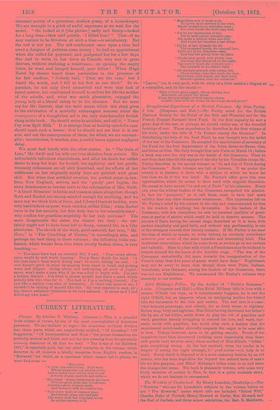CURRENT LITERATURE.
Pansies. By Adelina T. Whitney. (Strahan.)—This is a graceful little volume of verses, by one of the most accomplished of American poetesses. We are inclined to regret the somewhat artificial division into three parts, which are respectively entitled, "Of Occasion," "Of Suggestion," "Of Interpretation and Hope ;" the poems themselves are perfectly natural and fresh, and not the less pleasing from the genuinely womanly character of all that we read. "The Army of the Knitters, 1861," is especially good, but our chief favourite in the volume, which deserves in all respects a kindly reception from English readers, is "Released," for which, as a specimen which cannot fail to please, we must find room :—
"RELEASED.
"A little, low-celled room. Four walls Whose blank shut out all else of life,
And crowded close within their bound A world of pain, and toil, and strife,— " Her world. Scarce furthermore she knew Of God's great globe that wondrously Outrolls a glory of green earth, And frames it with the restless sea.
"Four closer walls of common pine; And therein lying, cold and still, The weary flesh that long bath borne Its patient mystery of Ill. "Regardless now of work to do, No queen more careless in her state, Hands crossed in an unbroken calm ; For other hands the work may wait. "Put by her implements of toil; Put by each coarse, intrusive sign; She made a sabbath when she died, And round her breathes a rest divine. "Put by, at last, beneath the lid, The exempted hands, the tranquil face; Uplift her in her dreamless sleep, And bear her gently from the place. "Oft she bath gazed, with wistful eyes, Out from that threshold on the night; The narrow bourn she crosseth now ; She standeth in the eternal light.
"Oft she hath pressed, with aching feet, Those broken steps that reach the door ; Henceforth, with angels, she shall tread Heaven's golden stair, for evermore !"
" Larva3," too, is very good, with its story of a little maiden's disgust at to, a caterpillar, and its fine moral :— "What if God's great angels, whose waiting love
Beholdeth our pitiful life below From the holy height of their heaven above, Couldn't bear with the worm till the wings should grow?"


































 Previous page
Previous page